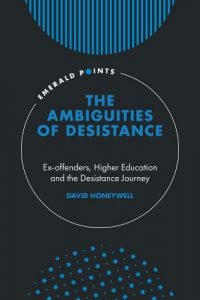Media depictions of prison: reflections on the BBC drama, ‘Time’
Written by David Honeywell and Rebecca Crook, Research Assistants, PROSPECT project
*Please be aware that this blog post refers to a recent BBC drama series that aired in June, 2021 called ‘Time’, and may include spoilers.
Dave:
For anyone who subscribes to the media’s usual ‘prisons are like holiday camps’ narrative should watch the recent drama series called ‘Time’. They would get to see the true brutality of prison life played before their very eyes from bullying, random violence, to self-harm and suicide. They will see how families are ripped apart and hopefully realise how disillusioned it is that prisoners are somehow of a particular ‘type’ and in fact made up of people from all walks of life. The main characters include a teacher who is sent to prison and a prison officer who eventually becomes a prisoner himself. The key point here is that anyone can be sent to prison no matter who you are or what your background is.
Prison dramas have always had a profound influence on my sense of self. In 1983 when I was sentenced to 30 months youth custody at 20, the oppressive unpredictable prison environment with its random violence and bullying invoked terrifying scenes from the film ‘Scum’. This film was centred on the brutality of an English borstal dominated by extreme violence between prisoners, and by staff on prisoners. Its crescendo included a brutal gang rape of a young prisoner who later took his own life, so this is what I expected youth custody prison to be like, especially when an older prisoner warned me about rape. I attempted an escape! I didn’t succeed and ended up in solitary confinement for my trouble
I was later influenced by the film ‘McVicar’ which was based on an autobiography I had read while in prison. The story is of 1960s bank robber John McVicar who famously escaped from Durham prison in 1968. I could relate to the environment and backdrop of this film because I spent over a year in Durham prison and during the early 80s McVicar was something of a cult hero to us!
I could even relate to the timeless sitcom ‘Porridge’. The brutality of prison life was never shown, although it was often alluded to. The writers of Porridge accurately captured many of the main aspects of prison life, including the daily routine of prison, from lights out at 10pm to the degrading and dehumanising ritual of slopping out (emptying waste) before toilets were installed in prisons. The characters used many of the common mantras such as ‘it’s them and us’ and ‘don’t let bas…ds grind you down’!
But the most influential television drama that has had a profound impact on me is the recently aired ‘Time’, which was brilliantly acted by Sean Bean and Stephen Graham and supported by an incredible cast. Time resonated with my prison experiences of the 1990s when I serving a five year sentence, because by then drugs, bullying, and suicide had started to become a major problem. Apart from the detailed, poignant and sometimes terrifying realties of prison life, one thing that stood out was how it highlighted how no one is beyond being sent to prison.
Dramatizations of prison life usually promote the environment as being full of rough and ready to fight violent, laddish, hardened prisoners but ‘Time’ highlighted the fact that even a mild-mannered teacher, played by Sean Bean, can commit unthinkable crimes and be sent to prison.
From day one his naivety was on the radar of other prisoners; prime for bullying. His cellmate was a serial self-harmer yet, as his mother clearly voiced, should not have been in prison but a psychiatric facility. Sadly, this is true for many prisoners caught up in a system that uses prison to punish those desperate for treatment.
In many ways Sean Bean reminded me of my own demeanour when I went to prison in 1995. The difference was I had already been in prison before and I had a violent disposition. ‘Time’ also captured the very dull, mind-numbing daily routine of prison life which was gripping in itself without the need to sensationalise violence to make it more entertaining. Here we had a newbie (first time prisoner) who deeply regretted his crime and would have to change to survive his time in prison.
Subjected to bullying he eventually took the advice of the prison’s ‘Mr Big’ and next time he was bullied he retaliated, which then earned him a new respect from his attackers. Sadly, this is standard in prison and if you don’t stand your ground your life is hell! The bullying scenes capture the essence of a prison system that can force mild mannered individuals towards violence with no choice other than to be a human punch bag.
Sue Johnstone, who plays the main character’s mother, uses a mantra I often use in my criminology lectures, “you’re here as punishment, not for it”, but the most heart-breaking moment was when his father died, and while being escorted to the funeral was taken back to his cell because of a security breach through no fault of his own.
The acute anxiety this would cause any prisoner would have to be subdued because any sign of weakness is a green light to the bullies! One of the most heartening aspects was the nurturing support from the prison chaplain. Sadly prison chaplains are mostly unsung heroes but ‘Time’ captures the unwavering support and care from the prison chaplain beautifully.
The prison chaplain is one person in prison to who you can be yourself and open up. One learns to internalise the pains of imprisonment and sometimes we forget how they felt until something like ‘Time’ reminds us. I didn’t think I would make it past the first episode, but once I began to accept it for what it was I binged watched all three of them in one night.
As painful as ‘Time’ is to watch, it is a must for anyone who may think a life of crime is glamorous. ‘Time’ highlights much more than the daily struggles of prison life and the incredible anxieties and fear of a newbie. It blatantly highlights a broken prison system which is why it should be essential for students, those who support the prison system and for the misinformed who actually believe prisons are like holiday camps!
Rebecca:
Being a researcher who works on projects aligned to the criminal justice system, I have experience of being in prison to collect data and speak to prisoner participants, but no personal lived experience of doing ‘Time’. On the recommendation of my colleague and friend, Dave, I sat down to watch the BBC series. Prior to watching I had spoken to Dave about his reaction to the programme, and he seemed almost unnerved by the accuracy of how prison life is depicted. He urged me to watch it and we continued our conversation over text as I watched, paused, reflected, and spoke to him about particular scenes as they unfolded. It was unnervingly real; the small details that capture both the mundanity and the brutality of prison speak to the care taken by writer Jimmy McGovern when researching for the show.
Another detail that struck me was how the lives of the main characters changed forever after making one bad choice. Albeit, in the prison officer’s storyline, a choice a lot of people may have also made had they found themselves in the same situation. I’m not a parent, but I believe the safety of your children goes above all else, and when met with the opportunity to prevent them from harm there’s only one route to take, no matter the personal risk. It was interesting to watch and consider how the lives of those working in the criminal justice system can also be turned upside down, and be greatly impacted by the work they do.
Dave had previously emphasised the significance of chaplains on prison wings, as a neutral ally, a non-judgemental ear. This sentiment has also been echoed by ex-offenders we have spoken to for the project over the last twelve months, so it was good to see this character shown on television, offering support and, at times, a glimpse of hope to those who needed it.
As Dave writes, quite early on in the series is a scene showing self-harm. This scene was particularly jarring, and was notably impactful for me as a viewer; with the aim of the PROSPECT project being to improve suicide prevention in prisons the reality of prison life and the challenges faced by those with mental health problems was, at times, difficult to watch.
It’s been a long time since I last entered a male adult prison, and after watching the series I wasn’t left fearful or anxious about re-entering that environment, but it did add fuel to existing fire inside me to continue working in this field, on projects that have a window of opportunity to support those who find prison life especially difficult. I would reiterate Dave’s urgency for other people with an interest in the criminal justice system to watch ‘Time’, to get a glimpse of the reality of what lies behind the prison walls, and be reflective of the line Dave, cites, “you’re here as punishment, not for it.”
For more information, please see a recent interview with writer, Jimmy McGovern, in Radio times.
About Dr Dave Honeywell:

Dr Dave Honeywell
Dr David Honeywell is a Lived Experience Research Assistant at the University of Manchester currently working on a project on prison suicide. David began his academic career in 2013 at the University of York where he worked as an Associate Criminology Lecturer alongside studying for a PhD. He has since taught criminology at Leeds Beckett University and the universities of Durham and Hull. In 2018, he completed his PhD in sociology about ex-prisoners and the transformation of self through higher education which was inspired by his own personal journey as an ex- prisoner who escaped a dysfunctional life through learning. While in prison in the 1990’s he gained an Open University qualification which later led to degrees in criminology, social research methods and sociology. After a 10-year break from study he returned to university following the publication of his autobiography Never Ending Circles which was inspired by the aftermath of the 2011 London riots. His book led to an ongoing career as a guest speaker and visiting lecturer on the university circuit.
David has recently published a monograph ‘The Ambiguities of Desistance’ from his PhD study. Further details can be found here: https://books.emeraldinsight.com/page/detail/The-Ambiguities-of-Desistance/?k=9781839827877

About Rebecca Crook:

Rebecca is a Research Assistant at the University of Manchester, currently working full-time on the PROSPECT project. She has worked at the university in the Division of Psychology and Mental Health for the last three years on projects around offender health, and postgraduate researcher mental health and wellbeing. Rebecca’s higher education background is multi-disciplinary; her undergraduate and taught postgraduate degrees are both in Criminal Justice, and she is in the final stages of writing up her PhD in Public Health. At the moment, Rebecca’s work on PROSPECT is focussed on developing a model of how the PROSPECT intervention will work in the prison environment.
Outside of work (and finishing her thesis), Rebecca enjoys socialising with friends and family, playing netball, and going to gigs. For the last twelve months she has found light relief in gardening in the sunshine, reading more, socialising (mostly through a computer screen), and lots of episodes of Ru Paul’s Drag Race. I mean… a lot.
